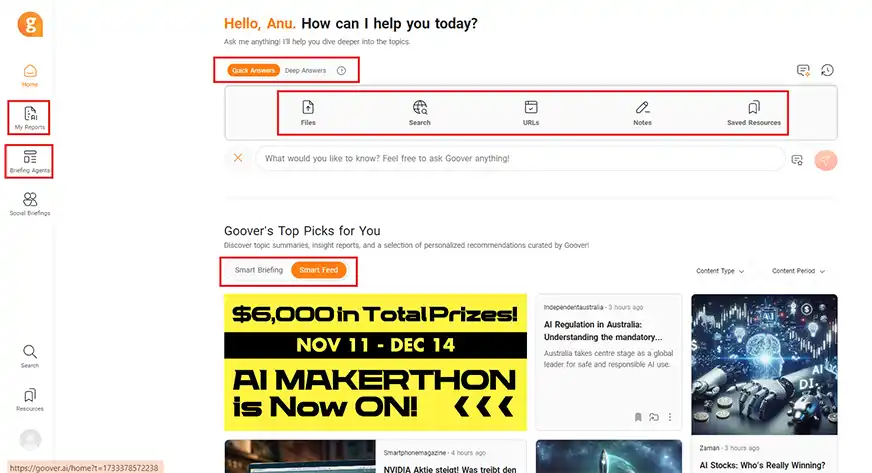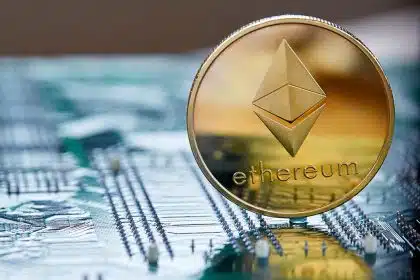In the last 2 years, we have seen ChatGPT transform from a creative LLM-powered chatbot into a powerful generative ai-powered search tool for all our queries. Its capabilities have grown beyond just generating, summarizing, and translating text to doing real-time research on the latest happenings and giving us up-to-date information on literally anything. Google Search has also powered up. It is now powered by Gemini models and offers quick ai-generated summaries for our queries. All these developments in chatbots and traditional search engines often make us question the need for GenAI search assistants like Goover and Perplexity. In this blog, we will have a showdown: ChatGPT vs Perplexity vs Google vs Goover. Let’s find out what each of them has to offer when it comes to web search.
What are GenAI Search Assistants?
Generative ai (GenAI) search engines employ LLMs to process and analyze vast amounts of information, generating comprehensive and relevant responses to user queries. By understanding the context of a search query, these tools can deliver more precise and informative results than traditional search engines. These search assistants retrieve current data from the internet, ensuring up-to-date responses with source citations instead of relying on the training data of their LLMs.
Two of the most popular Gen ai-powered search engines at present are Perplexity and Goover. Let’s explore each of these in more detail.
Also Read: 140+ Generative ai Tools That Can Make Your Work Easy
<h2 class="wp-block-heading" id="h-perplexity-ai-the-genai-way-to-do-a-web-search”>Perplexity.ai: The GenAI Way To Do a Web Search
<a target="_blank" href="https://www.perplexity.ai/” target=”_blank” rel=”nofollow noopener”>Perplexity ai is a conversational search engine that leverages generative ai to answer user queries in natural language. The platform integrates various generative ai models, both developed in-house and sourced from third parties, such as OpenAI and Meta’s Llama. A standout feature of Perplexity ai is its chatbot-like interface, which enables users to pose questions in natural language and receive concise summaries with cited sources in response.
It works as a RAG system while working with source files and as an agentic chatbot when working with external files and web searches to answer your queries. Currently, it is capable of reading through and analyzing Word documents, Excel sheets, and PDFs, which you can upload as resources.
When putting in a query, the Perplexity search bar lets you choose a Focus category based on your task. The search engine then generates responses only from the resources that come under the chosen category.
So, how do you decide which category to pick?
- If you wish to get information on the latest happenings you can choose the
- To solve mathematical problems, you can choose
- To get answers from research papers you can select
- For text generation tasks you can select
- To search for relevant media, you can select
- Lastly, to get insights from online focus groups on media like Reddit and twitter you can select
In its responses, Perplexity also shares links to images and videos that are relevant to the topic. These add great value to any search.
In its paid version (Perplexity Pro), it allows you to choose the LLM (Claude 3.5, GPT 4o & SONAR) that you wish to work with to generate images, and access APIs too. While the free version is great for getting factual results presented in an informative manner, the paid version allows you to work with more complex and logical problems and get answers in a tone that better suits the query.
Within PerplexityAI, you can get a daily rundown of all the latest happenings from around the world under the Discover section. In the Spaces section, you can collaborate with your team on focused categories while the Library consists of your search history on Perplexity.ai.
To learn more about Perplexity.ai, refer to the following blog.
Also Read: Perplexity ai vs Chatgpt : Which is a Better Option?
<h2 class="wp-block-heading" id="h-goover-ai-a-genai-research-agent”>Goover.ai: A GenAI Research Agent
Goover.ai is a new GenAI-based research assistant that can help users receive tailored answers to their queries. It can also generate insightful reports and briefings in just a couple of minutes using simple prompts. Goover allows you to upload their data and collaborate online and offline resources to get personalized and refined responses. It’s powered by Maven LLM, a large language model that offers mastery across varying subjects.

Goover.ai offers unique features letting you:
- Customize Results: Based on the user requirements, Goover offers the choice to generate both detailed and quick answers.
- Generate Reports: You can create reports based on your research. The style of the report can be business, comparison, investment, social media posting, or any other of the existing options. You can further select the style of these reports too.
- Briefing Agents: Goover allows you to create briefing agents from your searches. These agents keep track of the latest happenings on that topic and generate reports to help you stay updated.
- Track References: Every response generated by Goover comes with a reference link. It helps users to fact-check all the information and also reduces hallucinations in the generated responses.
- Smart Briefing: It offers quick summaries and helps you create agents to track all the latest updates on your interests.
Within Goover, you can interact with your PDFs, sheets, word documents & web URLs directly. You can also integrate your Google Drive into your Goover search!
To use Goover.ai, head to <a target="_blank" href="https://goover.ai/” target=”_blank” rel=”nofollow noopener”>https://goover.ai/ and sign up to create your account.
Once done, you can start exploring the various features of Goover.ai.
ChatGPT vs Perplexity vs Google vs Goover
Now that you are familiar with all four Gen ai-powered search assistants, let’s compare their capabilities and find out which one works best.
Here we will give the same search query to all four tools and compare their results. As we work with them, we will ask questions that we would ask traditional search engines and not the prompts that we write for LLM-powered chatbots.
<h3 class="wp-block-heading" id="h-search-query-1-ai-agent-trends-2025″>Search Query 1: ai Agent Trends 2025
Tool
Perplexity ai
Goover
ChatGPT
Google
Response
Provides detailed and quantitative insights, such as market valuation, CAGR, and industry-specific adoption trends.
Discusses general trends, but it leans more toward enterprise applications rather than overall ai agent trends.
Provides a high-level overview of trends such as integration in business, but misses factual data.
Just provides the key headings associated with the topic and the links to the relevant videos and articles.
According to me, the result for the search query in ChatGPT vs Perplexity vs Google vs Goover for “ai Agent Trends 2025” should consist of the market impacts and overall factual data regarding the technology and its impact on various industries.
- The response given by Perplexity was informative with facts and figures.
- Goover’s response had factual data but the content was a bit verbose.
- ChatGPT’s result was more broad and didn’t give any specific data.
- Google just provided links to relevant articles on the topic.
That’s why for this task, my ranking is:
- Perplexity
- Goover
- ChatGPT
Task 2: How to Prepare Chicken Tikka?
| Tool | Perplexity ai | Goover | ChatGPT | |
|---|---|---|---|---|
| Response | Provides detailed recipes offering ingredients, various cooking styles, and serving methods along with relevant videos and images. | Provides a well-written recipe and covers the ingredients although misses the exact amount for each. Also, it only covers a single cooking style. | Provides a detailed recipe with well-described ingredients, covering different cooking styles and simple serving details. | Just provides the links to the relevant video and blogs for the recipe. |
For this task, I would want the answer to be a detailed recipe explained in simple steps covering all the ingredients used, along with their quantities. It would be great if I could get insights on how to serve it along with the links to the videos to follow in case I run into any confusion.
- Perplexity’s response covered all the above points and so did ChatGPT’s. The only difference was that the response I got from PerplexityAI had the links to the videos too.
- Goover’s response didn’t have many details on each ingredient.
- Google’s result consisted of video and blog links.
That’s why for this task, my ranking is:
- Perplexity
- ChatGPT
- Goover
Task 3: Music Events in NYC in Jan 2025

| Tool | Perplexity | Goover | ChatGPT | |
|---|---|---|---|---|
| Response | Provides results in simple and clear listicle format with proper links to the sources but the details provided are incorrect. | Provides well-written and factually correct information regarding the events. Also provides the links at the end for review. | Provides summarised links of various music events in a simple listicle format. | Provides a listicle of a few relevant events and links to relevant blogs that have info on the events and tickets. |
For this task let us look at ChatGPT vs Perplexity vs Google vs Goover. I would want the answer to be a simple list with information regarding that event and its links.
- The response from Perplexity was the most readable – a simple listicle with all relevant details, but the details were incorrect.
- The result from Goover, although in small paragraphs with button links, was very informative.
- The response from ChatGPT was a concise listicle with some details on the event along with its link.
- Google’s response consisted of a small listicle with the usual links for relevant pages.
That’s why for this task, my ranking is:
- ChatGPT
- Goover
- Perplexity
Task 4: My Mobile Phone Screen has Frozen, What do I do?
| Tool | Perplexity | Goover | ChatGPT | |
|---|---|---|---|---|
| Response | Provides a detailed list of troubleshooting steps. Also provides links to credible sources like YouTube videos and related relevant questions at the end. | Offers a structured response. Also explains methods for both iPhone and Android devices with a detailed approach, providing links to the relevant blogs. | Summarizes solutions in a step-by-step list format, including force restart (Android and iPhone). Doesn’t offer any sources for more information. | Provides a step-by-step solution in a concise, listicle format at the top, followed by links to relevant blogs and a video to help with the same. |
For this task, I would prefer a response that balances simplicity and comprehensiveness, with easy-to-follow steps and references for further reading.
- Perplexity offers the most comprehensive troubleshooting guide, covering additional aspects like storage management and Android-specific details.
- Goover is great for detailed troubleshooting with both basic and advanced steps, though the lack of clickable references reduces its practicality.
- ChatGPT is clear and concise but focuses only on the most basic troubleshooting methods.
- Google is useful for a quick fix due to its concise and easily accessible information with external links.
That’s why for this task, my ranking is:
- Perplexity
- Goover
- ChatGPT
Task 5: When is the Next Cricket Match Between India and Australia?

| Tool | Perplexity | Goover | ChatGPT | |
|---|---|---|---|---|
| Response | Provides detailed information, schedules, and reliable links, making it comprehensive and readable. | Clear and concise response with useful extra information like team updates and streaming options. | Informative with a good mix of schedules and narrative context, but slightly verbose. | Quick and to the point, but lacks supplementary details for deeper engagement. |
For this task, the ideal response should provide the schedule in a concise and clear format with reliable links or supplementary details for those who want to explore further.
- Perplexity is comprehensive and includes links, making it suitable for users who want quick information with the option to verify or learn more.
- Goover balances detailed context and schedule information, offering insights into match significance.
- ChatGPT is concise and provides extra info like streaming and team news, catering to users interested in both schedule and match preparations.
- Google is the fastest and most to-the-point, ideal for users seeking just the schedule and venue.
That’s why for this task, my ranking is:
- Perplexity
- ChatGPT
- Goover
ChatGPT vs Perplexity vs Google vs Goover: Result and Review
Perplexity excels in detailed research, even in its free version—offering responses that rival those of GPT-4-powered ChatGPT. Goover is an excellent choice for structured and factually accurate responses. It comes with the added advantage of being free and enabling easy creation of reports and briefings. While ChatGPT performs well across various tasks, its true strength lies in handling creative or narrative-driven queries. Finally, Google remains the go-to option for immediate, no-frills answers. However, its GenAI-powered search summaries are not effective for all queries, slightly diminishing its original appeal.
Thus in this article about ChatGPT vs Perplexity vs Google vs Goover, we can see that each tool plays a unique role, ensuring that users can leverage their strengths based on the specific demands of the task.
Frequently Asked Questions
A. Generative ai-powered search engines leverage advanced Gen ai models to deliver precise, context-aware responses. Unlike traditional search engines, they generate summarized, conversational, or structured outputs tailored to user queries, often integrating real-time information and multimedia content for enhanced usability.
A. Yes, Goover allows you to create briefing agents that keep track of your search topic and prepare reports on any latest happenings around that topic.
A. For Thesis research, GenAI-powered search engines can be preferred. These tools provide fact-backed answers and resources for all the information that they provide. This minimizes the risk of misinformation getting added to the research questions.
A. Perplexity ai is so far leading the race in Gen ai search. Goover follows close by.
A. Yes. ChatGPT can be used for research but you need to fact-check all the information provided by it before using it for your research.
A. Yes. Google Search is still the most trusted search engine for most of the population on Earth. However, when it comes to providing quick, actionable insights – Google search is lagging behind the new Gen ai search engines.







